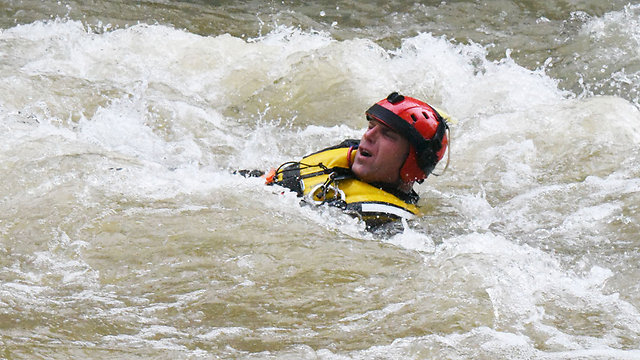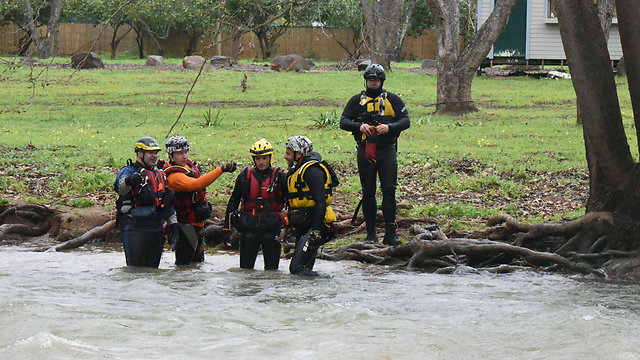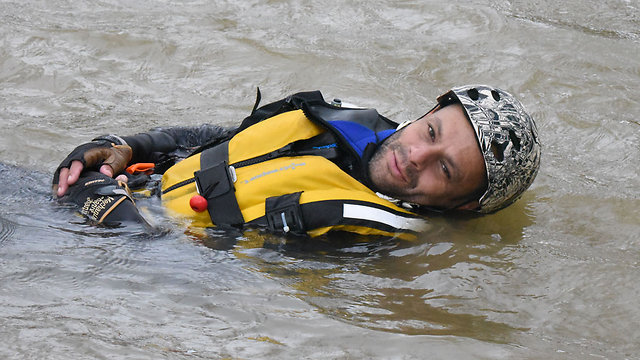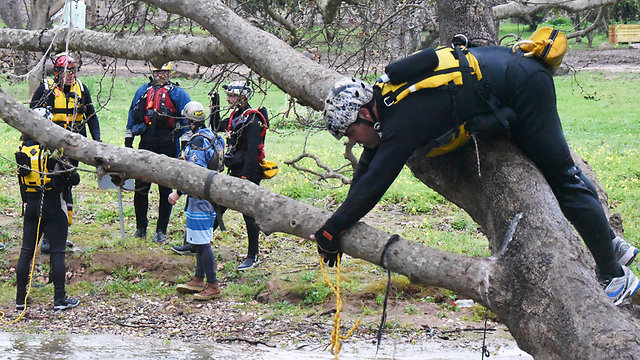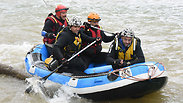
The Golan Rescue Unit sets out on river rescue training.
צילום: אביהו שפירא
Volunteer unit trains for river rescue
WATCH: Members of the Golan Rescue Unit in northern Israel undergo training in frigid river to prepare for strong tidal streams to come after storm's snow melts.
Not many people would be willing to spend a cold winter morning voluntarily dipping into frigid rivers that have a water temperature between 13-15 degrees Celsius, but this is exactly what members of the Golan Rescue Unit have undertaken in the past three days.
The rescuers took advantage of the tidal streams that emerged as a result of the winter weather that hit Israel in the past few days and practice rescue operations for three days and nights in the Jordan and Snir rivers.
The rescuers practiced saving tourists who fell into the water, individuals and groups, while using boats and ropes stretched out on both sides of the river or hanging from trees.
The crew also trained to throw and tie ropes, to buddy raft (being carried away by the stream while wearing a life jacket) – the swimmer tied to a rope – and rowing against the current in various compositions.
The training was conducted in preparation for the peak season for water tourists that will begin in northern Israel as the spring emerges.
After heavy rain and snow this winter, the currents are expected to be strong come spring in Israel's rivers located in the north. "If the tourists behave as they are expected, this training session will just be for the sake of training," said the commander of the unit brigadier general in reserves Tzvika Fogel. "Unfortunately, when it comes to Israelis, it is more complicated and it's likely they'll need our services. I hope we get out of this stronger and without any casualties."
All of the training, sometimes reaching 30 days or more per year, and all of the rescues, are performed by volunteer members of the unit who are residents of the Golan Heights and the upper Galilee. "We are a police volunteer unit," said Fogel. "We are on call 365 days a year, 24 hours a day. In addition, (we) invest our personal time and engage in training in order to be better."
Funding for the training sessions and equipment are donated from the police, IDF and other sources; however, the rescuing itself is done on a volunteer basis. The budget, the unit says, has stayed unchanged for 10 years, but the unit has still expanded with out recognition.
According to Fogel, there has been progress in recent years in the carefulness of tourists which Fogel attributes to heightened communications by the unit and by the nature reserves and natural parks.
Last year, there was a decrease in water rescues because of a drought that led to light currents.
Commanding the water division of the Golan Rescue Unit is Shmulik Cohen from the Ramot moshav. Cohen was one of the founders of the crew who was sent by the police to Turkey in 2000 to participate in the initial training course and has taken part in several important and dangerous rescues, including that of a soldier who drowned during an exercise in which they crossed the Jordan River in 2003.
"People don't understand that the current in the rivers of the north are strong," said Cohen. "The waters are cold and the crossing is dangerous. If you want to cross the river, you must find an organized spot with a bridge. It is not something that everyone can do."
According to Cohen, the unit does not just specialize in water rescues but also climbing and wrapping ropes and locating missing persons. Cohen also warned of the danger in the upcoming season saying: "The amount of rescues this year depends on the strength of the currents and as you see now the currents this year are strong," said Cohen.
Amir Shoshana, from Kibbutz Ortal, a member of the unit, says that that volunteering in the unit is his service to the community. "You can call it Zionism. It's for the country, the society and mutual responsibility. This is what we're here for."











